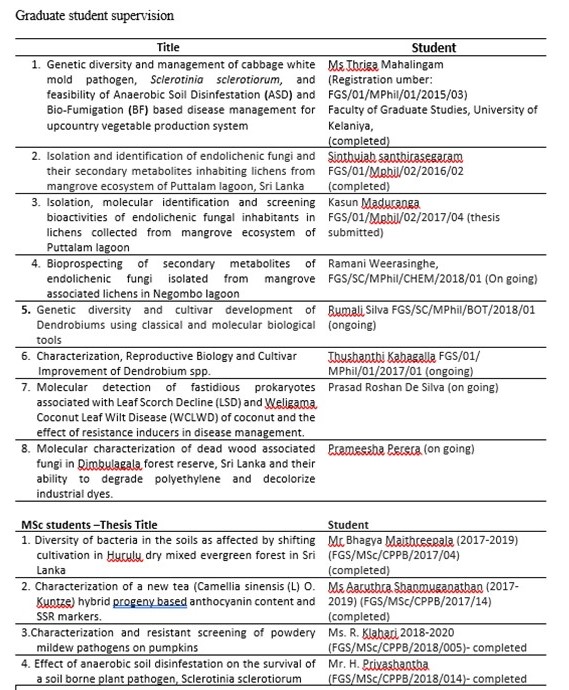
Prof. (Ms) Renuka N. AttanayakeProfessor
PhD (WSU, USA), MSc (WSU, USA), BSc (Kelaniya)
Research Interests
- Molecular detection of plant pathogens
- fungicide resistance
- fungal population genetics
- Molecular markers and linkage mapping
- Fungal mediated polyethylene degradation
Selected Publications
- Weerasinghe, K.E., Kannangara, A.T., Attanayake, R.N., Rajapakse, C.S.K. and Halmillawewa, A.P., 2025. Carotenoid pigments of Kocuria flava PUTS1_3 isolated from sediments of Puttalam lagoon mangrove ecosystem, Sri Lanka exhibit bioactive properties. Scientific Reports, 15(1), p.15226.
- Srimali, P.U.N.E., Deshappriya, N., Attanayake, R.N., Manamgoda, D.S. and Munasinghe, M.L.A.M.S., 2025. First report of Fusarium falciforme causing damping‐off of Capsicum annuum in Sri Lanka. New Disease Reports, 51(2), p.e70032.
- Siridewa, K., De Silva, W., Ratnayake, R.M.C.S., Wijesundara, S., Perera, D. and Attanayake, R.N., 2025. Species identification and pollination biology of an economically important true halophyte, Salicornia brachiata Roxb. Aquatic Botany, 196, p.103827.
- Jayasundara, Y., Herath, N., Buddhipala, A., Bandara, M.D., Jayasinghe, L., Attanayake, R., Perera, D. and Paranagama, P., 2025. Nutritional Composition and Bioactive Properties of Salicornia brachiata: A Comparison of Drying Methods. Natural Product Communications, 20(1), p.1934578X251315822.
- Kottawa-Arachchi, J.D., Ranatunga, M.A., Sharma, R.K., Chaudhary, H.K., Attanayake, R.N., Amarakoon, A.M.T., Gunasekare, M.K., Sharma, B., Kumar, N. and Sood, V.K., 2024. Morpho-molecular genetic diversity and population structure analysis to enrich core collections in tea [Camellia sinensis (L.) O. Kuntze] germplasm of Sri Lanka and India. Genetic Resources and Crop Evolution, 71(6), pp.2597-2616.
- Shevkar, C., Weerasinghe, R., Dubey, G., Attanayake, R.N., Weerakoon, G., Kalia, K., Paranagama, P. and Kate, A.S., 2024. Bioprospecting of Endolichenic Fungus Phanerochaete chrysosporium from Mangrove Associated Lichen Bactrospora myriadea for Anticancer Leads. Indian Journal of Microbiology, pp.1-10.
- Gunarathne, A., Harasgama, H.D.R.V.L., Wijewickrama, T., Attanayake, A., Attanayake, R.N. and Ratnayake, R.M.C.S., 2023. Rediscovery, identity, and conservation strategies of a critically endangered endemic plant, Hedyotis quinquinervia Thwaites (Rubiaceae) in Sri Lanka. Journal of the National Science Foundation of Sri Lanka, 51(3).
- Perera, P., Herath, H., Paranagama, P.A., Wijesinghe, P. and Attanayake, R.N., 2023. Wood decay fungi show enhanced biodeterioration of low-density polyethylene in the absence of wood in culture media. Plos one, 18(7), p.e0288133.
- De Silva, P.R., Perera, C.N., Bahder, B.W. and Attanayake, R.N., 2023. Nested PCR-based rapid detection of phytoplasma leaf wilt disease of coconut in Sri Lanka and systemic movement of the pathogen. Pathogens, 12(2), p.294.
- Ekanayake, S., Egodawatta, C., Attanayake, R.N. and Perera, D., 2023. From salt pan to saucepan: Salicornia, a halophytic vegetable with an array of potential health benefits. Food Frontiers.
- de Silva, R., Herath, H., Ratnayake, S., Attanayake, R. and Senanayake, P., 2023. Pollen biology and reproductive ecology of selected paleotropical Dendrobiums and its commercial hybrids. Journal of Pollination Ecology, 33, pp.64-79.
- Perera, T.W.N.K., Weerasinghe, W.R.H., Attanayake, R.N. and Paranagama, P.A., 2022. Biodeterioration of low‐density polyethylene by mangrove‐associated endolichenic fungi and their enzymatic regimes. Letters in Applied Microbiology, 75(6), pp.1526-1537
- Kottawa-Arachchi, J.D., Ranatunga, M.A.B., Amarakoon, A.M.T., Gunasekare, M.T.K., Attanayake, R.N., Sharma, R.K., Chaudhary, H.K., Sood, V.K., Katoch, R., Banyal, D.K. and Piyasena, K.G.N.P., 2022. Variation of catechin and caffeine content in exotic collection of tea [Camellia sinensis (L.) O. Kuntze] in Sri Lanka and potential implication in breeding cultivars with enhanced quality and medicinal properties. Food Chemistry Advances, 1, p.100108.
- Attanayake, R.N., Xu, L. & Chen W. 2019. Sclerotinia sclerotiorum populations: clonal or recombining? Trop. plant pathol. (2019) 44: 23. https://doi.org/10.1007/s40858-018-0248-7
- Mahalingam, T., Guruge, B.M.A., Somachandra, K.P., Jayasekara, E.A.E.S.S., Rajapakse, C.S.K. and Attanayake, R.N. 2018. Phenotypic variation of cabbage white mold pathogen, Sclerotinia sclerotiorum in the upcountry commercial cabbage fields in Sri Lanka. Journal of the National Science Foundation of Sri Lanka, 46(2), pp.159–164. DOI: http://doi.org/10.4038/jnsfsr.v46i2.8416
- Maduranga K, Attanayake RN, Santhirasegaram S, Weerakoon G, Paranagama PA. 2018 Molecular phylogeny and bioprospecting of Endolichenic Fungi (ELF) inhabiting in the lichens collected from a mangrove ecosystem in Sri Lanka. PLOS ONE 13(8): e0200711. https://doi.org/10.1371/journal.pone.0200711
- Mahalingam, T. Guruge, B. M. A., Somachandra, K. P., Rajapakse, C. S. and Attanayake, R. N. 2017. First Report of White Mold Caused by Sclerotinia sclerotiorum on Cabbage in Sri Lanka. Plant Disease. 101(1):249
http://dx.doi.org/10.1094/PDIS-05-16 0693-PDN - Attanayake R.N., Tennekoon,V., Johnson, D.A., Porter, L.D., del Rı´o-Mendoza, L., Jiang, D., Chen, W. 2014. Inferring outcrossing in the homothallic fungus Sclerotinia sclerotiorum using linkage disequilibrium decay. Nature Heredity 1–11 http://www.nature.com/hdy/journal/v113/n4/full/hdy201437a.html
- Attanayake, R. N., Porter, L., Johnson D.A., Chen, W. 2012. Genetic and phenotypic diversity and random association of DNA markers of the fungal plant pathogen Sclerotinia sclerotiorum from soil in a fine geographic scale. Soil Biology and Biochemistry. 55: 28-36
- Attanayake, R. N., Carter, P. A. Jiang, d. h., Río-Mendoza, L. D. and Weidong Chen. 2013. Genetic and phenotypic divergence of the Sclerotinia sclerotiorum populations from China and USA. Phytopathology. 103: 750-761
- Attanayake, R. N., Glawe, D. A., McPhee, K. E. Dugan, F. M., Chen, W. 2010. Erysiphe trifolii– a newly recognized powdery mildew pathogen of pea. Plant Pathology. 59: 712–720
- Attanayake, R.N., Dugan, F.M., Glawe, D. A., McPhee, K. E. 2010. Potential alternative hosts for pea powdery mildew pathogen Erysiphe trifolii. Pisum genetics 42
- Attanayake, R., Glawe, D., Dugan, F.M., Chen, W. 2009. Erysiphe trifolii causing powdery mildew of lentil (Lens culinaris). Plant Disease.93:797-803. APSnet Feature, August, 2009 (Editor’s pic)
- Attanayake, K. P. R. N., Glawe, D. A., McPhee, K. E., Dugan, F. M., and Chen, W. 2008. First report of powdery mildew of chickpea (Cicer arietinum) caused by Leveillula taurica in Washington State.
Online. Plant Health Progress doi:10.1094/PHP-2008-0702-01-BR. - Dugan, F. M., Glawe, D.A., Attanayake, R. N., Chen. W. 2009. The importance of reporting new host-fungus records for ornamental and regional crops. APSnet Feature, February 2009. http://www.apsnet.org/online/feature/biogeography/. (Editor’s pic)
- Ali, H. S. Alam, S., Attanayake, R.N., Rahman, M., Chen, W. 2012. Population structure and mating type distribution of the chickpea blight pathogen Ascochyta rabiei form Pakistan and the United States. Journal of plant pathology 1 (2).
Book chapters
- Attanayake, R. N., Chen, W., and Wunsch, W. 2016. Powdery mildew (PP1790-8), in: Markell, S., Pasche, J., and Porter, L. North Dakota Cooperative Extension Service Publication PP1790.
- Attanayake, R., Chen, W., Glawe, D., Dugan, F. Powdery mildew of lentil. 2011 In: Chen, W., Sharma, H. C., Muehlbauer, F. editors. Compendium of chickpea and lentil disease and pests. APS press, St. Paul, MN. p. 49-51.
- Dugan, F. M., Attanayake R., Glawe, D., Chen, W. In: Chen, W., Sharma, H. C., Muehlbauer, F. editors. Powdery mildew of chickpea. 2011 In: Compendium of chickpea and lentil disease and pests. APS press, St. Paul, MN. p. 51-52.
- Njambere, E., Attanayake, R., Chen, W. 2010. Applications of molecular markers and DNA sequences in identifying fungal pathogens of cool season grain legumes. In: Gherbawy, Y. and Voigt, K., editors. Current Advances in Molecular Fungal Identification. Berlin: Springer. p 79-92.
On Going Research
- Population biology of Sclerotinia sclerotiorum in Sri Lanka
- Mating type diversity of late blight pathogen
- Soil fungal metagenomic studies
- Fungal mediated polyethylene degradation
Teaching
- Bioinformatics, Molecular breeding, Molecular Plant Microbe Interaction, Genetics
Awards, research grants and graduate student supervisions
Awards
Winner of the 2023 OWSD-Elsevier Foundation Award for Early-Career Women Scientists in the Developing World
- Outstanding Early Career Researchers in the Faculty of Science, University of Kelaniya in 2018 and 2019
- Senate awards in 2019, 2020, 2021
- Travel award to attend ICPP, Boston 2018.
- JANE award from American Phytopathological society for returning scientists working on Phytophthora infestans 2014
- Travel award to attend Smithsonian workshop on multiple sequence alignment and phylogeny estimation, May 20-22, WA DC, 2012.
- Student travel award to attend 52nd soil-borne plant pathogen conference, San Marino, CA 2012
- APS-Pacific division student travel award, 2011
- 2nd Place- Student oral presentation competition. North American Pulse Improvement Association, 2009
- GPSA Graduate Student Travel Grant, Washington State University 2008
- 2nd Place- Student oral presentation competition. North American Pulse Improvement Association, 2007
- APS Student Travel Award, 2008


